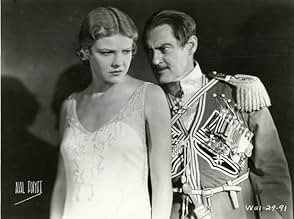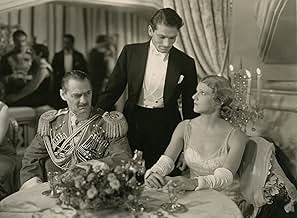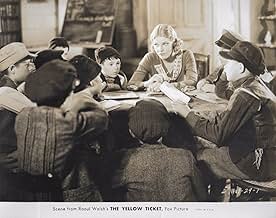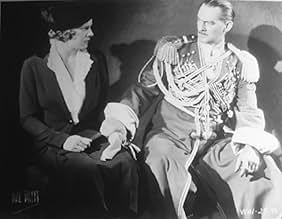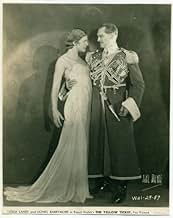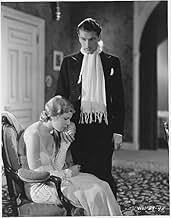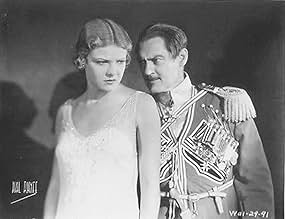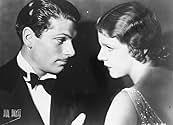A young Russian girl is forced into a life of prostitution in Czarist Russia, and she and a British journalist find their lives endangered when she reveals to him information regarding the s... Read allA young Russian girl is forced into a life of prostitution in Czarist Russia, and she and a British journalist find their lives endangered when she reveals to him information regarding the social crimes rampant in her country.A young Russian girl is forced into a life of prostitution in Czarist Russia, and she and a British journalist find their lives endangered when she reveals to him information regarding the social crimes rampant in her country.
- Director
- Writers
- Stars
- Awards
- 1 nomination total
Oscar Apfel
- British Embassy Butler
- (uncredited)
Frederick Burt
- Minor Role
- (uncredited)
Emile Chautard
- Headwaiter
- (uncredited)
Gilbert Emery
- Sir Hubert, British Ambassador
- (uncredited)
Ruth Feldman
- Woman at Passportcheck
- (uncredited)
Esther Howard
- Prisoner
- (uncredited)
Boris Karloff
- Drunken Orderly
- (uncredited)
Henry Kolker
- Passport Clerk
- (uncredited)
Anne Kunde
- Prison Matron
- (uncredited)
Ivan Linow
- Wrestler
- (uncredited)
- Director
- Writers
- All cast & crew
- Production, box office & more at IMDbPro
Featured reviews
Another gem I have never heard of. I am also unfamiliar with the talents of Elissa Landi. I am glad to have become acquainted with both!
Landi plays a Jewish woman living in oppressed Russia in 1913. She wants to travel to be with her father who is dying in a prison. But all Jews are being watched and aren't allowed passports to travel. Landi finds out that there is a thing called a "yellow ticket" that is given to prostitutes in order for them to travel freely. So she registers as one, not thinking about any consequences this may have. She gets to the prison too late. Her father has died.
But now that she is "registered" as a prostitute, she can't find work. Her family is informed and they shun her. She can't stay and live where she is, and she can't go home.
Even though she remains "a good girl", all the officers and cads know she has a yellow ticket and assume what she is and expect her to "put out". Barrymore plays a sleazy Czar who makes her life miserable. Finally, Olivier comes along and tries to save her. He is a reporter from London looking for stories on the "real" Russia. She provides lots of information and they end up falling for each other.
Barrymore, however, is out to get her. He wants the bad but true stories in the world's papers about Russia to stop and he knows Landi is behind what Olivier is writing and publishing. He captures Landi and gives her a choice of ending the relationship and her aid to Olivier or be responsible for Olivier's death or give her self over to Barrymore for one disgusting night.
Landi does a great job as the victim being used and torn by society, politics, and the morals of the period. Great job and a very entertaining film.
Be classy and check it out!
Landi plays a Jewish woman living in oppressed Russia in 1913. She wants to travel to be with her father who is dying in a prison. But all Jews are being watched and aren't allowed passports to travel. Landi finds out that there is a thing called a "yellow ticket" that is given to prostitutes in order for them to travel freely. So she registers as one, not thinking about any consequences this may have. She gets to the prison too late. Her father has died.
But now that she is "registered" as a prostitute, she can't find work. Her family is informed and they shun her. She can't stay and live where she is, and she can't go home.
Even though she remains "a good girl", all the officers and cads know she has a yellow ticket and assume what she is and expect her to "put out". Barrymore plays a sleazy Czar who makes her life miserable. Finally, Olivier comes along and tries to save her. He is a reporter from London looking for stories on the "real" Russia. She provides lots of information and they end up falling for each other.
Barrymore, however, is out to get her. He wants the bad but true stories in the world's papers about Russia to stop and he knows Landi is behind what Olivier is writing and publishing. He captures Landi and gives her a choice of ending the relationship and her aid to Olivier or be responsible for Olivier's death or give her self over to Barrymore for one disgusting night.
Landi does a great job as the victim being used and torn by society, politics, and the morals of the period. Great job and a very entertaining film.
Be classy and check it out!
Admittedly, my world history knowledge is lacking, so I was at a bit of a disadvantage watching "The Yellow Ticket." It took place in 1913 Russia and Jews were being persecuted by the Russian government. They were not allowed passports to travel unless you were a woman entertaining men.
Marya Kalish (Elissa Landi) had to get what was called a "yellow ticket" in order to travel to see her father in prison. The yellow ticket indicated that she was a prostitute even though she got her ticket by paying for it, not by becoming a prostitute. It was one more method of demeaning Russian Jews.
She was harassed and harangued throughout her movements throughout Russia. She caught the attention of Baron Igor Andreeff (Lionel Barrymore) the architect behind the yellow tickets. He wanted from her exactly what every other man she came across wanted.
She caught a break when she met a British reporter named Julian Rolfe (Laurence Olivier). He gave her a job as a secretary and kept her from having to be in the Russian streets. He only had positive things to write about Russia until Marya told him of the seedier, corrupt, and oppressive side of Russia.
"The Yellow Ticket" was eye opening and somewhat educational. If I had one complaint, it would be the romantic relationship between Marya and Julian.
I don't have a problem with two people falling in love, but I do think it detracted from the heavier message of the movie--that of Russian oppression of Jews. Marya went from a distressed, marginalized, and mistreated woman to a normal girl in love in short order. She was gaily spending her time with Julian helping him write his articles as though she hadn't a care in the world. It was as if the Jewish oppression ceased to exist, or simply wasn't as important. She was so happy in love I didn't even think she was still on Russian soil! I thought for sure that as merrily as she was working that the threat of her being locked up for helping Julian write disparaging articles didn't exist. When I saw that she was still in Russia I couldn't help but think, "How dumb or suicidal are you?" I figured she and Julian were smart enough to throw stones from a safe distance--like England.
TYT certainly had a good premise even if they veered from it with a love story. I guess in the 30's a man couldn't help a woman out of a jam unless he was in love with her.
Free on YouTube.
Marya Kalish (Elissa Landi) had to get what was called a "yellow ticket" in order to travel to see her father in prison. The yellow ticket indicated that she was a prostitute even though she got her ticket by paying for it, not by becoming a prostitute. It was one more method of demeaning Russian Jews.
She was harassed and harangued throughout her movements throughout Russia. She caught the attention of Baron Igor Andreeff (Lionel Barrymore) the architect behind the yellow tickets. He wanted from her exactly what every other man she came across wanted.
She caught a break when she met a British reporter named Julian Rolfe (Laurence Olivier). He gave her a job as a secretary and kept her from having to be in the Russian streets. He only had positive things to write about Russia until Marya told him of the seedier, corrupt, and oppressive side of Russia.
"The Yellow Ticket" was eye opening and somewhat educational. If I had one complaint, it would be the romantic relationship between Marya and Julian.
I don't have a problem with two people falling in love, but I do think it detracted from the heavier message of the movie--that of Russian oppression of Jews. Marya went from a distressed, marginalized, and mistreated woman to a normal girl in love in short order. She was gaily spending her time with Julian helping him write his articles as though she hadn't a care in the world. It was as if the Jewish oppression ceased to exist, or simply wasn't as important. She was so happy in love I didn't even think she was still on Russian soil! I thought for sure that as merrily as she was working that the threat of her being locked up for helping Julian write disparaging articles didn't exist. When I saw that she was still in Russia I couldn't help but think, "How dumb or suicidal are you?" I figured she and Julian were smart enough to throw stones from a safe distance--like England.
TYT certainly had a good premise even if they veered from it with a love story. I guess in the 30's a man couldn't help a woman out of a jam unless he was in love with her.
Free on YouTube.
1931's "The Yellow Ticket" was adapted from a 1914 play set in 1913 Czarist Russia, with second billed Lionel Barrymore replacing younger brother John in the scenery chewing role of Baron Andreeff, persecuting the young Jewish beauty Marya Kalish (Elissa Landi), whose only means of travel is the Baron's dreaded 'yellow ticket,' branding this virginal schoolteacher a prostitute. 24 year old Laurence Olivier, in only his fourth feature (second in Hollywood), plays British newspaperman Julian Rolfe, who has spent two pleasant months in Russia, but now has his eyes opened to the degradations endured by Marya; his subsequent negative articles incur the wrath of the furious Baron. The luminous Elissa Landi would soon star in her best known vehicle, "The Sign of the Cross," and there are tiny parts for native Russians such as Mischa Auer and Michael Mark. Boris Karloff, just two films away from "Frankenstein," remains typecast as a lecherous drunken orderly, whose unwelcome ministrations get him arrested (his best lecherous drunk came 3 months earlier in "Five Star Final"). This was his third film working with Lionel Barrymore, co-starring in the 1926 silent "The Bells," and in 1929 directed by Lionel in "The Unholy Night."
Raoul Walksh was never a favourite of mine, I often found his pictures revolting in character and almost inhuman, and this is a particularly disturbing story but the more important for its ruthless realism. It deals with prostitution in tzarist Russia the year before the first world war, it exposes an abyss of social problems and abuse, as the main character Marya Kalish (Elissa Landi) and her family are Jewish and exposed to the tzar's pogroms. Her father ends up in jail and is placed in a dungeon in St. Petersburg, where he gets ill, and the only way for his only daughter to visit him is to acquire a "yellow ticket", a passport for prostitutes, which allows them to go around everywhere, while they have to regularly report to the police. She only avails herself of the ticket to visit her father and never works as a prostitute, although she is troubled enough especially by militaries and Lionel Barrymore as the abominable chief of police. In a critical moment Laurence Olivier as nothing less than a downright Englishman appears as a newspaper man to save her from even worse troubles to come. The finale is tremendous in its chaotic scenes of the outbreak of the war, but it is a good story efficiently told and extremely interesting for its exposure of the conditions of prostitutes in the Russia before the wars, - that only made everything even worse in Russia.
The fact that this was made in 1931 is irrelevant because this is as virtually good as any adventure romance you'd get made now. Set amongst one of the many sorry episodes in Russian history it has a particular resonance today.
This might very well be the best film that beautiful Austrian actress Elissa Landi ever made. Allegedly the granddaughter of the famous celebrity Empress Sissi of Austria, she projects an almost regal purity and restrained emotion which is perfect for the innocent yet cynical role of Marya. One wonders how she felt when the script mentioned that her grandmother's husband, Franz Josef of Austria had just signed that memo to 'start' the First World War?
If there are any Lionel Barrymore fans left - which there should be - this picture is for them. Not sure whether his portrayal of the sinister head of Nikolai II's secret police is that accurate but who cares - he's a fantastic Hollywood villain. Although manically over the top, his less than subtle performance is simply explosive. Like all the best Hollywood villains, he creates the perfect character to instantly hate.
And there's also young Larry! In early thirties movies you often see soon to be 'great' actors struggling to learn the ropes but not with young Mr Olivier. It's not quite his first film and he's not the lead but somehow this guy already seems to be at the top of his game.
This isn't one of those old films which you think could have been better if it was made today - everyone and everything in this is as good as you can imagine. When they put their minds to it, Fox Films really could make something superb. Atmospheric set design and innovative cinematography (James Wong Howe again) make this a proper work of art. But not a stuffy, cold piece you'd find in a museum - this is dynamic, buzzing with life. Raoul Walsh's direction never lets the tension falter, he gives this a break-neck sense of intensity to ensure your interest doesn't wane.
And I didn't even mention the naked ladies!
This might very well be the best film that beautiful Austrian actress Elissa Landi ever made. Allegedly the granddaughter of the famous celebrity Empress Sissi of Austria, she projects an almost regal purity and restrained emotion which is perfect for the innocent yet cynical role of Marya. One wonders how she felt when the script mentioned that her grandmother's husband, Franz Josef of Austria had just signed that memo to 'start' the First World War?
If there are any Lionel Barrymore fans left - which there should be - this picture is for them. Not sure whether his portrayal of the sinister head of Nikolai II's secret police is that accurate but who cares - he's a fantastic Hollywood villain. Although manically over the top, his less than subtle performance is simply explosive. Like all the best Hollywood villains, he creates the perfect character to instantly hate.
And there's also young Larry! In early thirties movies you often see soon to be 'great' actors struggling to learn the ropes but not with young Mr Olivier. It's not quite his first film and he's not the lead but somehow this guy already seems to be at the top of his game.
This isn't one of those old films which you think could have been better if it was made today - everyone and everything in this is as good as you can imagine. When they put their minds to it, Fox Films really could make something superb. Atmospheric set design and innovative cinematography (James Wong Howe again) make this a proper work of art. But not a stuffy, cold piece you'd find in a museum - this is dynamic, buzzing with life. Raoul Walsh's direction never lets the tension falter, he gives this a break-neck sense of intensity to ensure your interest doesn't wane.
And I didn't even mention the naked ladies!
Did you know
- TriviaThe film takes place from 1913 to August 4, 1914.
- GoofsThe monoplane which spirits Marya and Rolfe out of Russia is of a much later date than 1914.
- ConnectionsEdited from La danse rouge (1928)
Details
- Release date
- Country of origin
- Language
- Also known as
- The Yellow Ticket
- Production company
- See more company credits at IMDbPro
- Runtime
- 1h 28m(88 min)
- Color
Contribute to this page
Suggest an edit or add missing content

